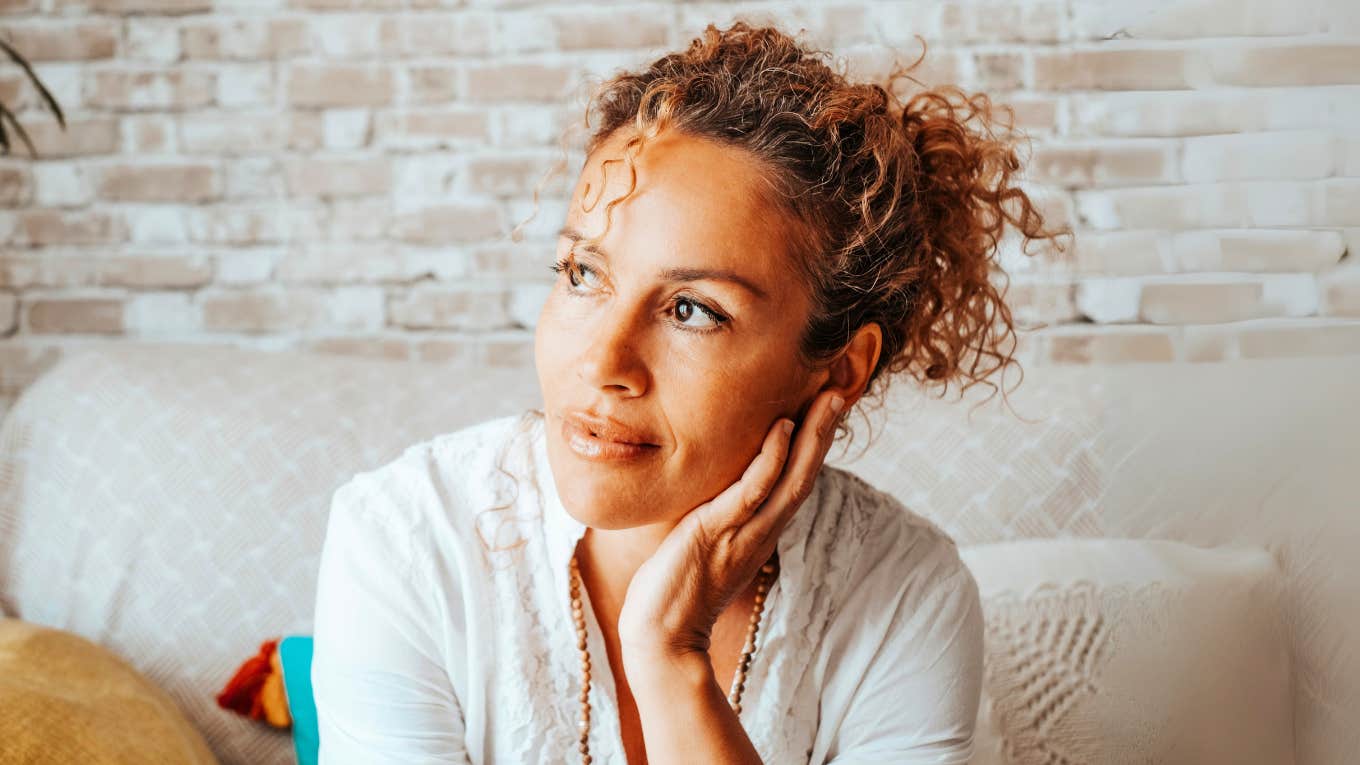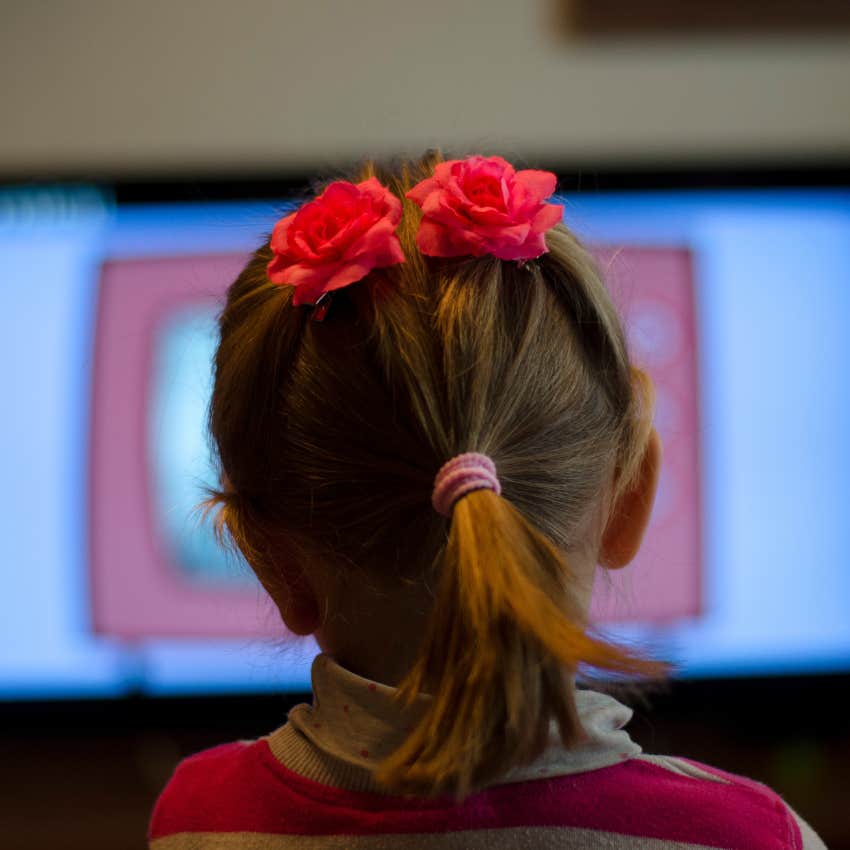No Dates, No Intimacy, No Romance — My Year Of Total Emotional Reset
After hitting rock bottom, I pressed pause.
 simonapilollatnf | Canva
simonapilollatnf | Canva Somehow, we've already passed April. And yes, I know, people are always making inane comments like, “Can you believe it’s almost/already [insert name of month]?” But April carries special significance for me this year. It marks a strange anniversary — 12 months since separating from my soon-to-be ex-husband.
We were married for 15 years, and before that, we’d dated for five. Before that, I’d dated another man for over three years, with only two weeks elapsing between our official breakup and my first date with the man who would become my husband. Before that, meaning for all of high school and most of college, I’d been single. And I’d hated every second of it.
During that time, I experienced a few situationships, a word I wish had existed back then because maybe I would have recognized it for the all-too-common experience it is and wouldn’t have been so hard on myself. Instead, I thought of them as relationships that failed to launch because I’d messed up somewhere along the way. Either I’d been too standoffish or I’d been too forthcoming, and I didn’t know how to flirt right. Whatever it was, it was my fault.
I knew I had a wonderful life, all in all. I wasn’t popular, but I wasn’t unpopular. I had supportive parents, I got good grades, I always had friends, and on good hair days, I was pretty okay-looking. But in that intense teenage way, when I looked at my life, all I saw was a big boyfriend-shaped hole.
Having grown up on a steady diet of movies about Prince Charmings and damsels in distress, I was taught from an early age to pine.
 Miroslav Gracic / Shutterstock
Miroslav Gracic / Shutterstock
Even if I thought it was gross when they kissed, and resolutely grimaced while covering my eyes, I learned that the kiss was a requisite if you wanted a happily ever after. I experienced my first crush in the second grade, and in the third grade, I was asked to the school square dance by a boy I didn’t particularly care for.
I said yes because I didn’t want to hurt his feelings. The next day, he dumped me for someone else. I didn’t know what “dumped” meant, but the sniggers from my classmates indicated it probably wasn’t good.
In middle and high school, I knew that other things were important — family and friends, school and sports — but all the songs that filtered through my boombox, through the car radio, and through the speakers at school dances made it abundantly clear that romantic love trumps all. I needed a boy, and eventually a man, to complete me.
I came to understand “being single” as synonymous with “looking for a boyfriend,” and oh, was I looking. If one were to read my high school diaries (ugh), one would assume that’s all I ever thought about. When I finally found a boyfriend, it didn’t matter that the reality of my relationship bore little resemblance to the romances I had been sold. I had achieved the coveted status of “girlfriend,” and that was enough.
We enjoyed each other’s company, though, because we worked opposite schedules, we didn’t see one another much. I didn’t mind. While I loved the idea of an all-consuming romance, I was also very busy, and I cherished my alone time, too.
When we eventually parted ways, I told my friends I was looking forward to being single, but I wasn’t, really. So when the man who would become my husband gave me his number just two weeks later, I rushed gratefully into his arms.
It would be 20 years before I found myself single again. Well, sort of single, hovering in that purgatory between marriage and divorce. The rules weren’t exactly clear.
But it didn’t matter. I had no intention whatsoever, and still have no intention whatsoever, of rushing into any man’s arms.
It’s been almost a year now of sort-of singledom — not yet single on paper, but receiving no emotional or physical fulfillment from the man I once called my partner.
I feel like I should be seeking solace in crooning breakup songs, but truth be told, I’m no longer that broken up about the breakup. Furious, yes. Depleted, yes. Disillusioned, yes. Sad? Not really, not anymore.
The breakup songs that speak to me right now are the angry ones, like Olivia Rodrigo’s Vampire, which I recently listened to on repeat for over an hour. But the heartsick songs? The pining songs? The you-were-my-everything songs? Meh. I’ll pass.
More than one person has asked me when I’m going to get on the dating apps, and the mere thought of it makes me vaguely nauseous. I’ve watched other freshly separated couples dive headfirst into the roiling waters of online dating, and I kind of admire their pluck, their energy, their unflagging optimism.
The men, I’ve noticed, tend to find someone new and settle in quickly, desperate for someone to take care of them. The women, on the whole, are less eager, but still resigned to the game. After all, if you are not a girlfriend or wife, dating is what you’re “supposed” to be doing.
Even if you’re not looking for your so-called Prince Charming, you need some romance in your life. Or at the very least, some decent action. But do you?
The pervading cultural assumption that our lives are incomplete without ongoing romantic and physical intimacy is a bizarre one, to say the least — and it speaks to the enormous burden we place on romantic partners to fulfill one person’s sweeping spectrum of needs.
I was my husband’s roommate, financial partner, intimate partner, co-parent, and best friend. And I was supposed to be all those things at once, in perpetuity.
If, say, I wasn’t enjoying intimacy six months after childbirth, I had to figure out how to “fix” that because everyone knows that healthy couples are supposed to be having regular intimacy. The doctor who prescribed me the cream to thicken my walls, which had thinned out during childbirth and made intimacy feel like a repeated stabbing, never once asked me if I wanted to be intimate.
It wasn’t just about the stabbing sensation, but I didn’t tell my doctor this. I was tired of touch. My body didn’t feel like my own anymore — everyone wanted a piece of it. My daughter tugged at my hands, and my son suckled from my breasts, and my breast pump did its ritual squeezing.
My husband sulked because he wasn’t getting a piece, too. Meanwhile, bodily fluids were extracted from me and projected onto me and deposited in diapers and on bathroom floors. In bed, I simply wanted to lie horizontally somewhere clean and dry and feel myself in my own skin.
I went to the doctor out of desperation because my husband was getting fed up with me, and obviously, I should be wanting to be intimate. Not wanting it was not normal, and it was also selfish. Because, you know, men have needs.
Romantic intimacy, in its various forms, can enrich a life, but do we need it at all times, and do we need it to be so all-encompassing?
When I pause to think about what I want moving forward, it looks nothing like a new husband, or even a traditional boyfriend.
I don’t want a perpetual partner, for one. For most women, desire has always been cyclical, and research suggests that desire can also be seasonal. (It’s not just a coincidence that my birth month, September, is the most popular birth month.) While there’s a lot of chatter about the challenges of sustaining a robust love life with a single person, we talk much less about the social pressure to simply be having regular intimacy. We assume that if we’re not getting it, there’s a deficit in our lives.
But are we listening to our bodies? Is the intimacy we might be getting worth the energy of the pursuit? At this moment in time, I’m not feeling the urge for any partner, and though I’m quite certain I’ll feel stronger urges during upcoming seasons of my life, I’m also quite certain they will still ebb and flow. And I’m even more certain that I won’t need a co-parent/financial partner/roommate/best friend to fulfill them.
For now, I’m investing my energy elsewhere. Instead of focusing on a single co-parent, I’m working to build a network of friends and family members whose lives are intertwined with my children’s lives, who offer mentorship, perspective, and support.
My children are learning that their dad, unfortunately, is unlikely to be a reliable presence in their lives, and society is doing its best to scare me into believing that without a consistent father figure, they are destined for an adulthood rife with substance abuse, depression, and anxiety. But I know they can still grow into resilient, flourishing adults with the consistent love of a chosen family, in whatever form that takes.
Just as I can offer my children multiple family figures, I can enjoy the company of multiple friends. And what a blessing, that these friends all have their own homes, rooms, and beds.
Except for a couple of years in college, this is the only time in my life that I’ve had a room of my own, and I can’t imagine ever willingly letting someone move back in.
 Gladskikh Tatiana / Shutterstock
Gladskikh Tatiana / Shutterstock
I now sleep splayed in the middle of my queen-sized bed. No one steals my sheets, and no one snores, except maybe occasionally me.
We can sleep in our own beds and still enjoy relationships that are enriching, complicated, and meaningful. Research has shown that platonic love leads to increased life satisfaction and better health. According to Rhaina Cohen, author of The Other Significant Others:
Centuries and millennia ago, friendship was this exalted relationship. There was an emotional intensity and affection that we now code as only being possible within romantic or intimate relationships. You have ancient thinkers saying that they could imagine no better aspect of life than friendship. It could be the central emotional relationship in your life rather than a peripheral one. Now we say people are “just friends.”
In a society that emphasizes romantic love and isolates couples, often disproportionately burdening women, marriage can be an intensely lonely experience. If anything, I feel more connected and more supported than I did before my separation. Without the daily burden of constantly attending to my husband’s needs, while receiving little in the way of reciprocity, I have more energy to invest in other relationships.
In our hyper-individualistic culture, the “single life” is sometimes romanticized as an untethered life, in which we answer to no one and can do exactly as we please. And while I’m looking forward to exercising more of these freedoms when I become an empty nester, “untethered” isn’t exactly what I’m going for here. If anything, I want more community and deeper ties.
When I think back to the least lonely times of my life, they were my childhood, high school, and college years, during which I was supported not just by family but by close-knit circles of friends. While I spent most of my high school and college years pining for a boyfriend, I never paused to consider that friendship in adulthood would become vastly harder to find and prioritize.
During a rough patch in a high school friendship, I remember wallowing in No Doubt’s Don’t Speak, assuming it was a song about losing a best friend. Gwen Stefani wailed, I really feel… that I’m losing my best friend… and I wailed right along with her. Then I learned that Don’t Speak was just another song about romantic love.
I felt deeply betrayed. There is a yawning chasm between my experience of being single in my teenage years and my experience of being single in my forties. Over the last 12 months, I’ve been pleasantly surprised to find that I don’t feel any overwhelming deficit or lack in my life. It makes me wonder if all our pining and our perpetual pursuit of partnership is driven by an intrinsic desire to be partnered with one person, or driven by society’s unrelenting obsession with romantic love.
The nature/nurture debate will always rage on, but it is worth noting that this unrelenting obsession seems to be relenting. Research from the American Enterprise Institute’s Survey Center on American Life shows that not only is singledom on the rise, particularly amongst young women, but more and more single people say they are simply not looking to date.
Meanwhile, as Substack writer Stephen Follows found, the percentage of films listed as “Romance” on IMDb has declined from 34.8% in 2000 to 8.6% in recent years. And while an estimated 67% of the top 40 songs were about romantic love between 1960 and 2010, the Top 10 songs now on the Billboard charts are increasingly about friendship and self-empowerment. Coincidence? I think not.
It’s nice to know that as an unofficially single person, and a soon-to-be officially single person, I’ll be in good company. I haven’t given up on romance forever. But I doubt it will ever take center stage in my life again, and I’m perfectly okay with that.
Kerala Taylor is an award-winning writer and co-owner of a worker-owned marketing agency. Her weekly stories are dedicated to interrupting notions of what it means to be a mother, woman, worker, and wife. She writes on Medium and has recently launched a Substack publication, Mom, Interrupted.

